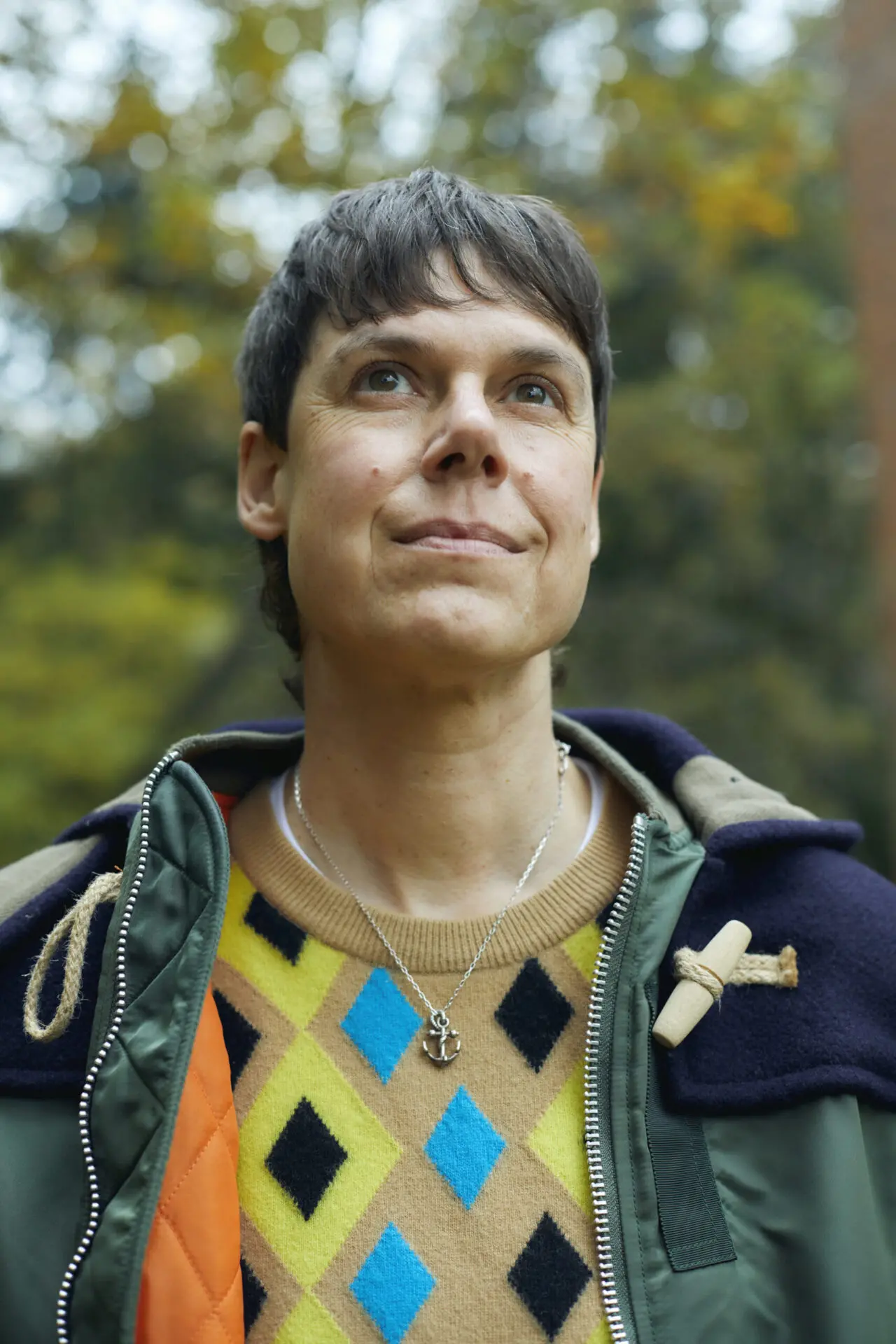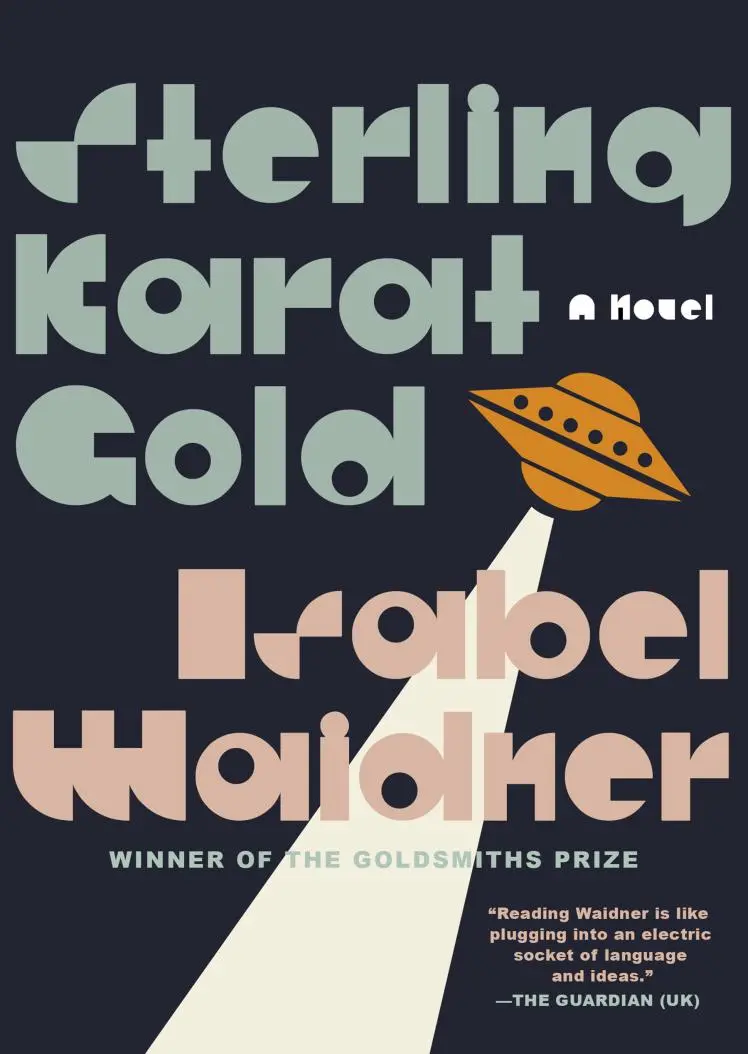Isabel Waidner understands the attack faced by the protagonist of their novel Sterling Karat Gold. It’s the kind of violence they once experienced on the streets of North London.
Waidner portrays the intersectionality of queer and trans theory in Sterling Karat Gold, which won the Goldsmiths Prize, and was shortlisted for the Orwell Prize for Political Fiction and the Republic of Consciousness Prize. The novel follows Sterling Beckenbauer as they are plunged into a terrifying and nonsensical world one morning when they are attacked, then unfairly arrested, in their neighborhood in London.
In this week’s PEN Ten interview, Waidner explores their own history and writing with Aleah Gatto, PEN America’s coordinator for membership engagement. (Amazon, Bookshop)

1. Sterling Karat Gold offers readers a fresh, entirely unique way to see how queerness and artistic creation are so often met with contention, physical harm, and injustice. When you began writing the book, what were you hoping to accomplish? Was there a specific moment or experience that led you to write this story?
My initial aim was to critically engage with some of the realities that shape queer and working-class lives right now, while also imagining possibilities for joy, resistance and sociality.
At the beginning of the novel, the main character Sterling is attacked by a group of bullfighters in a regular residential area in North London. One experience in particular inspired this scene: circa fifteen years ago, I was walking down a busy main road in the exact area where the novel is set, during the day, minding my own business. I noticed a group of local school boys coming towards me, not thinking anything of it.
Retrospectively, I realize I’d underestimated the extent to which I’d be on their radar—I was in my early thirties at the time and, as a nonbinary person, I reliably passed as a teenage boy myself in most contexts. Filing past me, left and right, every single member of the group punched me in the upper half of my body, almost casually, without as much as slowing down, or speeding up, for that matter. I’d unwittingly crossed a territorial boundary that I, not au fait with London secondary school cultures and rivalries, had been oblivious to. Or did the youths clock me after all? Did my queerness provoke the attack? It’s this kind of minefield the novel takes issue with; this kind of violence, which is normalized to a degree, at community- as well as governmental level.
2. The lives of the main character, Sterling Beckenbauer, and their friends would have ended up much differently if it weren’t for time travel—a key plot device. Why did you decide to incorporate time travel into the story?
You’re right, time travel functions as a built-in get out clause in the novel! I wanted to mobilize the enormous potential of the form I’m working in—fiction—to be fun and cathartic, and to throw up unexpected escape routes.
“My initial aim was to critically engage with some of the realities that shape queer and working-class lives right now, while also imagining possibilities for joy, resistance and sociality.”
3. The novel contains several embedded narratives in which Sterling and their best friend, Chachki, perform as a part of their series of plays, Cataclysmic Foibles. In several instances, the elements of the plays are indistinguishable from those of the “real” story. Can you explain your reasoning for presenting some parts of the novel this way?
Sterling Karat Gold deliberately blurs conventional boundaries between what counts as real and as imagined. For example, the Cataclysmic Foibles performances you mention don’t just provide entertainment or educational value; as you say, they’re actual sites where the ‘real’ narrative can develop and progress—or regress, as it were. Here in the UK, we have seen a sustained ideological attack on the arts and humanities by consecutive Conservative governments since 2010, so it’s almost as if these sectors or cultures were deemed to be dangerous for those in power… this perceived (and I’d wager actual) ability of art and performance to affect social change is played out in the novel.
4. The novel is written in first person from the eyes of Sterling, who speaks with clever innuendo and colloquialisms. Can you talk about how you developed Sterling’s voice?
I write as a working-class, queer novelist with a background of migration, and my perspective shapes everything in the novel, including Sterling’s voice. This isn’t to say that Sterling’s voice came naturally to me, or that it is my regular voice. It took me twenty years of writing to hit this particular note.
5. There is no doubt that your writing style is patented: rich with personification, absurd situations, and a strong narrative voice. Based on the content, and on your writing style, with which other books would Sterling Karat Gold fit on the shelf?
Writers Who Love Too Much, Dodie Bellamy and Kevin Killian
100 Boyfriends, Brontez Purnell
Large Animals, Jess Arndt
Lote, Shola von Reinhold
In the Dream House, Carmen Maria Machado
The Lizard Club, Steve Abbott
Smiling in Slow Motion, Derek Jarman
Slaughterhouse-Five, Kurt Vonnegut (on account of time travel alone)
Murphy, Samuel Beckett
The Trial, Franz Kafka
Faust, Johann Wolfgang von Goethe
Etc.
Etc.
“I write as a working-class, queer novelist with a background of migration, and my perspective shapes everything in the novel, including Sterling’s voice.”
6. What was one of the most surprising things you learned while writing Sterling Karat Gold?

I can write time travel narratives!
7. What has been the most insightful criticism of your work that you’ve received?
A Goodreads reviewer once wrote that ‘Waidner is a modern-day Joe Orton’—an outrageous compliment! Orton was a British working-class playwright writing acclaimed absurdist, irreverent and satirical plays in the nineteen-sixties. His success was short-lived—he was murdered by his gay lover at the age of 34. To a certain extent, the comparison encouraged me to write my forthcoming novel [Corey Fah Does Social Mobility, Graywolf Press, 2024] which puts Orton’s autobiography in conversation with my own—in unusual ways, I suspect! Insightful or not, the comment was certainly generative.
8. What motivates you to write?
Initially, the lack of unique and diverse working-class literature available in the UK particularly motivated me—in other words, a sense of injustice. To some extent this still holds.
More importantly, perhaps, literature has been the one constant in my life; a space of possibility where elsewhere possibility may have been foreclosed. What keeps me going these days is the love and appreciation I have for writing and reading, my belief in literature’s ability to affect real-life change, and the ongoing project of catching up with myself as an evolving novelist.
“What keeps me going these days is the love and appreciation I have for writing and reading, my belief in literature’s ability to affect real-life change, and the ongoing project of catching up with myself as an evolving novelist.“
9. What types of books do you like to read? What are you reading right now?
In more recent years, I mainly read the work of my contemporaries, often in the shape of ARCs, pamphlets, and manuscripts. I just received The Balls of Alban by British artist and writer Carl Gent through the post, as well as the novel Mrs. S by K Patrick, and the hybrid collection Last Night a Beef Jerk Saved My Life by D Mortimer—all representative of a current ‘wave’, if you like, of nontraditional British writing smashing it out of the park. This last year, I also re-read Joe Orton’s entire back catalog as research—see question above—including his plays, an early novel, his diaries and biography. I would recommend them, with reservations.
10. What do you consider to be the biggest threat to free expression today?
In the UK? The Conservative government.
Isabel Waidner is a writer based in London. They are the author of Corey Fah Does Social Mobility, Sterling Karat Gold, We Are Made of Diamond Stuff and Gaudy Bauble. They are the winner of the Goldsmiths Prize 2021 and were shortlisted for the Goldsmiths Prize in 2019, the Orwell Prize for Political Fiction in 2022 and the Republic of Consciousness Prize in 2018, 2020 and 2022. They are a co-founder of the event series Queers Read This at the Institute of Contemporary Arts, and they are an academic in the School of English and Drama at Queen Mary University of London.


